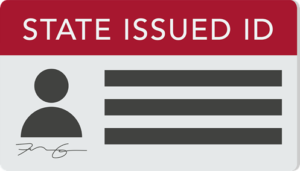The Controversy Behind Labeled IDs for Sex Offenders
By Faith P. – Criminal Justice Intern
 State-issued driver’s licenses, also known as identification cards, are one of the most common government documents. Not only do these cards permit individuals to legally operate motor vehicles, but they are also required to verify an individual’s identity in many circumstances. Most of these identification cards contain the same personal information for everyone; however, sex offenders in some states are required to have one more piece of information. According to Probation Information Network’s research, 9 states require offenders to obtain an ID that has specific markings intended to identify the individual as a sex offender. Five of these states require a small symbol that signifies to law enforcement that the owner of the ID is a sex offender, whereas the other four states require phrases like “Sex offender” to be printed in bold letters on the individual’s license. Recently, this requirement has been brought into the spotlights of Alabama and Louisiana courts by questioning its adherence to the First Amendment. Considering the emergence of legal cases surrounding this rare requirement, it is important to question how effective this requirement is in keeping communities safe and how it might cause undue problems for offenders trying to function in everyday society.
State-issued driver’s licenses, also known as identification cards, are one of the most common government documents. Not only do these cards permit individuals to legally operate motor vehicles, but they are also required to verify an individual’s identity in many circumstances. Most of these identification cards contain the same personal information for everyone; however, sex offenders in some states are required to have one more piece of information. According to Probation Information Network’s research, 9 states require offenders to obtain an ID that has specific markings intended to identify the individual as a sex offender. Five of these states require a small symbol that signifies to law enforcement that the owner of the ID is a sex offender, whereas the other four states require phrases like “Sex offender” to be printed in bold letters on the individual’s license. Recently, this requirement has been brought into the spotlights of Alabama and Louisiana courts by questioning its adherence to the First Amendment. Considering the emergence of legal cases surrounding this rare requirement, it is important to question how effective this requirement is in keeping communities safe and how it might cause undue problems for offenders trying to function in everyday society.
It is very common to be asked to present one’s ID or driver’s license. An ID is required to enter bars, reserve hotel rooms, obtain a job, conduct business at a bank, make certain purchases, and many other situations. Consequently, an offender with a labeled ID must frequently present it in order to function as a productive citizen in society, and may be subjected to harassment and persecution as a result. Five states, Alabama, Arizona, Delaware, Tennessee, and West Virginia, attempt to reduce this issue by requiring only a small designation known to law enforcement. Other states take a more extreme approach: Florida, Kansas, Mississippi, and Oklahoma have made it a requirement for an offender’s ID to explicitly read “Sex Offender” in bold lettering across the front.
Recently, however, this requirement has been a large topic of debate. In the Alabama case, Doe v. Marshal, a judge deemed the current explicit labeling of an offender’s ID to be unconstitutional. Federal Judge Keith Watkins states in his Memorandum Opinion and Order that, “By using “CRIMINAL SEX OFFENDER” instead of a single letter, the State goes beyond what is necessary to achieve its asserted interest.” Judge Watkins believes that the state has a rightful interest in being able to easily identify sex offenders, however by not using the least restrictive method of identifying such offenders, the requirement goes beyond the limits of the law. The state argued that offenders were not compelled to present their identification; instead, they suggested using a passport to verify their identity. Judge Watkins also denounces this suggestion by the state, exclaiming that not all offenders have access to or the means to obtain a passport.
 Louisiana is the most recent state to change its implementation of the labeled ID requirement. The court case, Louisiana v. Hill, centers around the legality of the labeled ID requirement. Tazin Hill was charged with altering his identification card by scratching off the “Sex Offender” label placed on his ID. Hill later brought his case to court, claiming that the words placed on his ID violated his First Amendment right by making him represent the government’s message. The Louisiana Supreme Court agreed with Hill on the grounds that the requirement violated Hill’s First Amendment right. In Louisiana’s Petition for a Writ of Certiorari, they argue that this requirement does not affect offenders’ freedom of speech and is an essential tool to the state. They claim that in rare instances such as a power outage, the community needs an extra security measure to identify the status of individuals. The state also denounced the discreet approach to this sex offender requirement, stating that this method is barely noticeable. After much consideration and differing opinions among the Louisiana courts, they turned to the United States Supreme Court. However, as of October 2021, the U.S. Supreme Court declined to hear the case and denied the state’s petition for a Writ of Certiorari. Without the opinion of the U.S. Supreme Court, states who choose to implement this sex offender requirement are left to their own devices in order to determine the legality of such a law. Today, this requirement is no longer enforced in Louisiana. Since the U.S. supreme court declined to hear the case, the decision made by the Louisiana Supreme Court still stands. The labeled ID requirement is deemed unconstitutional in the state of Louisiana. However, it is possible in the near future that the Louisiana State Legislature will adopt a code or designation for the IDs, as Alabama did, rather than remove the labels altogether.
Louisiana is the most recent state to change its implementation of the labeled ID requirement. The court case, Louisiana v. Hill, centers around the legality of the labeled ID requirement. Tazin Hill was charged with altering his identification card by scratching off the “Sex Offender” label placed on his ID. Hill later brought his case to court, claiming that the words placed on his ID violated his First Amendment right by making him represent the government’s message. The Louisiana Supreme Court agreed with Hill on the grounds that the requirement violated Hill’s First Amendment right. In Louisiana’s Petition for a Writ of Certiorari, they argue that this requirement does not affect offenders’ freedom of speech and is an essential tool to the state. They claim that in rare instances such as a power outage, the community needs an extra security measure to identify the status of individuals. The state also denounced the discreet approach to this sex offender requirement, stating that this method is barely noticeable. After much consideration and differing opinions among the Louisiana courts, they turned to the United States Supreme Court. However, as of October 2021, the U.S. Supreme Court declined to hear the case and denied the state’s petition for a Writ of Certiorari. Without the opinion of the U.S. Supreme Court, states who choose to implement this sex offender requirement are left to their own devices in order to determine the legality of such a law. Today, this requirement is no longer enforced in Louisiana. Since the U.S. supreme court declined to hear the case, the decision made by the Louisiana Supreme Court still stands. The labeled ID requirement is deemed unconstitutional in the state of Louisiana. However, it is possible in the near future that the Louisiana State Legislature will adopt a code or designation for the IDs, as Alabama did, rather than remove the labels altogether.
 Based on these two court cases, it is clear that the special identification card requirement placed on sex offenders is a controversial topic that continues to be challenged. It is important to shine a light on the issues behind the more restrictive method of identifying sex offenders. The purpose of this law is to keep communities safe while being able to better inform law enforcement. States who advocate for this strict requirement emphasize the importance of extra security measures in case of extremely rare circumstances such as power outages that would limit access to online registries. Some advocates also dislike the discrete method, essentially claiming that it would take too much time to discover the status of offenders. If some states are able to inform the public and law enforcement using discrete methods, why are some states still enforcing stricter methods that lead to complicated legal battles? Furthermore, if the majority of the United States can keep their communities safe without such a requirement, why do some states still choose to include it within the list of restrictions for sex offenders? These are just a few questions that arise from this rare requirement. Offenders face significant challenges upon reentry, and strict requirements only compound the hardship and add to the public ridicule many offenders are subjected to. Although it is important to keep our communities safe, it is also important to provide all offenders with the opportunity for success and a second chance.
Based on these two court cases, it is clear that the special identification card requirement placed on sex offenders is a controversial topic that continues to be challenged. It is important to shine a light on the issues behind the more restrictive method of identifying sex offenders. The purpose of this law is to keep communities safe while being able to better inform law enforcement. States who advocate for this strict requirement emphasize the importance of extra security measures in case of extremely rare circumstances such as power outages that would limit access to online registries. Some advocates also dislike the discrete method, essentially claiming that it would take too much time to discover the status of offenders. If some states are able to inform the public and law enforcement using discrete methods, why are some states still enforcing stricter methods that lead to complicated legal battles? Furthermore, if the majority of the United States can keep their communities safe without such a requirement, why do some states still choose to include it within the list of restrictions for sex offenders? These are just a few questions that arise from this rare requirement. Offenders face significant challenges upon reentry, and strict requirements only compound the hardship and add to the public ridicule many offenders are subjected to. Although it is important to keep our communities safe, it is also important to provide all offenders with the opportunity for success and a second chance.